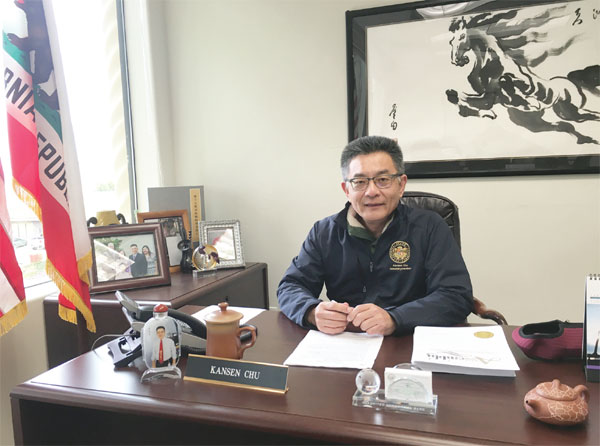Politician pushes at the grassroots
California State Assemblyman Kansen Chu puts his insights into Chinese communities and US-China relations to use in making a difference
Kansen Chu, a California state assemblyman, is also looking to be a diplomat of sorts when it comes to promoting grassroots exchanges between the US and China.
Unlike most Asian-American elected officials who were born or at raised in the US, Chu, 64, is the first Chinese-American assemblyman in California who immigrated to the US as an adult.
During his nine years of service on the San Jose City Council and in the state Assembly, Chu has gained valuable insight into the Chinese communities and the US-China relationship.
Misunderstanding sometimes stems from a lack of knowledge; the most effective way to address that is to promote cultural exchange at the grassroots level, he said.
Taking his own children as an example, Chu said the American-born Chinese may think and act differently from those born in China, so it's important to educate them about Chinese culture and instill pride of their heritage.
"Even daily activities, such as small talk with your neighbors, can help promote the cultural understanding," he said. He called on the Chinese community to play an active part in public affairs and engage with other ethnic communities.
Chu and the Anhui native association in the Bay Area will bring a Huangmei Opera, a more than 200-year-old opera originating in Anhui province, to the area in May.
Before Chu was elected to the San Jose City Council in 2007 as its first Chinese-American council member, he had devoted himself to civic activities and services in many local organizations, including the Organization of Chinese Americans, Silicon Valley, the Asian Law Alliance and Shin Shin Education Foundation. He joined the board of trustees of the Berryessa Union School District in 2002.
Having watched the public education issues closely, Chu said the Chinese have established for themselves an image of "doing well in school", but good academic performance alone do not mean the greatest contributions to the society.
The Chinese value their children's education, and they have experiences that they can share with students who are not doing as well in school, he said.
To be successful on the whole in society, the Chinese communities need to understand the importance of "give and take", otherwise it would be detrimental to the image of Chinese Americans and even to the relations between the two countries, he said.
Chu, who was recently appointed as chairman of the Committee on Arts, Entertainment, Sports, Tourism and Internet Media of the California Assembly, said another important way to learn about a different culture is through tourism. He believes there is great potential to promote further tourist exchanges between California and China.
"This year is the China-US Tourism Year, and the South Bay (which he represents) has a lot of tourist attractions for Chinese visitors," Chu said. "However, we do not receive many tourists from China yet, since San Francisco is still a major destination. I think there's much to do to bring Chinese visitors here."
In recent years, more and more Chinese choose to visit the US in small, independent groups and tend to seek experiential tours off the beaten track. The Silicon Valley, as a capital of innovation and home to the tech giants such as Apple, Google and Facebook, has been an attraction for young Chinese tourists.
Besides the high tech companies, the Tech Museum of Innovation in San Jose can be another attraction for innovation lovers, he said. The museum is family-friendly, and features galleries and exhibits and offers learning programs.
Chu said it is not widely known to Chinese that San Jose was also the home to early Chinese pioneers in the American West 150 years ago, adding that five Chinatowns were built, destroyed or disappeared over the 150 years.
Today people can trace the early Chinese immigrants' footprints at a 60-acre history park - History San Jose - which recorded the stories of diversity as well as innovation in the area.
"It will be a great attraction to Chinese tourists who are interested in exploring the history of early Chinese immigrants," Chu said.
He said he would work with the Chinese Consulate General in San Francisco as well as the tourism industry to do something for the China-US Tourism Year.
"As long as they (Chinese tourists) arrive, we have a lot to show them," he said.
liazhu@chinadailyusa.com
|
Kansen Chu, a California state assemblyman, in his office in Milpitas. Lia Zhu / China Daily |

























